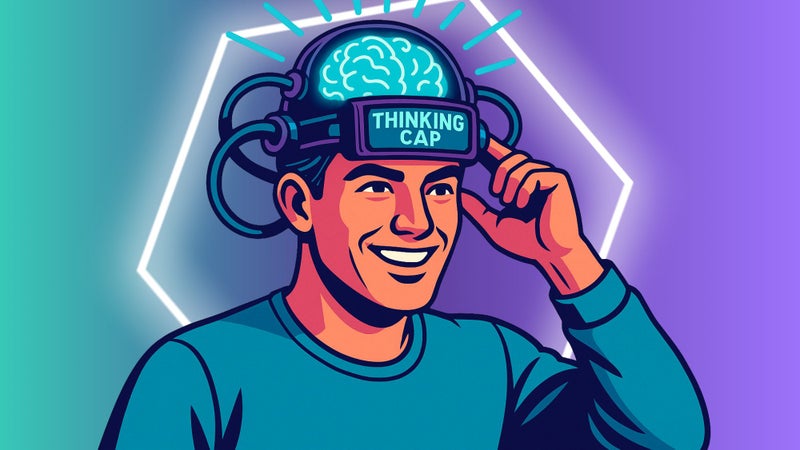Contents
- Thinking Skill #1: Analytical Thinking Skills
- Thinking Skill #2: Critical Thinking Skills
- Thinking Skill #3: Creative Problem-Solving Skills
- Thinking Skill #4: Emotional Intelligence Skills
- Thinking Skill #5: Communication Skills
- Thinking Skill #6: Continuous Learning Skills
- Thinking Skill #7: Focus and Deep Work Skills
- Pros Don't CV-Stuff. They Stack The Best Skills for Remote Work
Don't make the mistake of thinking technical skills are THE skills for remote jobs. Technical skills get you in the door, but elite thinking skills determine who stays, who gets promoted, and who becomes irreplaceable. Don't rest on your credentials. Start developing the cognitive depth that separates remote superstars from remote burnouts.
Drive for show. Putt for dough.
It's a saying every golfer knows. You can crush a 300-yard drive off the tee and look impressive. But you'll lose to the guy who can read greens and sink putts under pressure.
Remote work works the same way.
Technical proficiency is your long drive. Flashy. Will probably get you noticed. Might even get you hired.
But they're NOT what keeps you at the top.
Here's the uncomfortable reality: everyone worth their salt has technical skills.
The Python certification. The 2+ years working with AWS. The AI-bootcamp.
But the real differentiator. The spark that separates fast starters from the long-term winners. That's thinking skills.
Because in remote work, clear thinking beats fading credentials...EVERY...TIME.
Stop window-dressing your LinkedIn with technical badges. There are the 7 essential thinking skills for remote work that separate the pros from the duds.
Thinking Skill #1: Analytical Thinking Skills
TL;DR: Remote teams run on clarity. Analytical thinkers deliver it.
Analytical thinking is all about how you approach problems. Breaking complexity into manageable chunks, identifying patterns, and finding a practical path forward.
In the remote world, analytical thinkers are the lighthouse in the storm. Not waiting for someone else to illuminate the path, but providing clarity for everyone around them.
What's the big deal? According to WEF, seven in ten employers mark analytical thinking as an essential 2026 skill. Becoming your company's go-to person to turn big, fuzzy challenges into clear, actionable steps is a serious differentiator you NEED to cultivate.
Thinking Skill #2: Critical Thinking Skills
TL;DR: Strong decisions, without the hand-holding.
Critical thinking is the B.S. detector taking first place for 96% of employers - and for good reason. It helps you separate noise from signal, identify faulty assumptions, and avoid knee-jerk reactions under pressure.
Critical thinkers don't work on gut feelings. They assess. Asking 'Why is this happening?' 'What’s the root cause?' 'What’s the smartest move?'
In a remote setting - where ad-hoc gut-checks aren’t always possible - independent judgment is everything.
Thinking Skill #3: Creative Problem-Solving Skills
TL;DR: The ability to come up with new solutions when old ones break.
Don't mistake creative problem-solving for mood-boards and random brainstorming. It’s a structured, strategic way of thinking that asks, 'What if we tried this instead?'
This skill is all about questioning assumptions, challenging norms, and flipping perspectives.
Remote companies live on creative problem-solving. They've already rejected the status quo by going remote. They need people who can think around corners, not just follow the playbook.
When a project stalls, a customer churns, or a workflow breaks - a creative problem-solver doesn't panic. They think through the problem and pivot.
Thinking Skill #4: Emotional Intelligence Skills
TL;DR: The ability to understand, manage, and respond to emotions - yours and others’.
EQ isn’t just 'feelings'. It’s the foundation of intentional interactions.
You consider tone, anticipate reactions, and adapt your approach to maintain trust AND momentum.
In remote work environments, you can’t rely on body language or hallway small talk. You need to think through how your messages land, read between the lines and proactively support emotional dynamics across your team.
EQ isn’t just a soft skill. It’s strategic.
It builds trust and makes team members want to work with.
This is how you build human culture in a digital world.
Thinking Skill #5: Communication Skills
TL;DR: The ability to say the right thing, the right way, at the right time.
Communication as a thinking skill means you've outgrown word vomit.
You think through context before you speak. Anticipate confusion. Shape messages for clarity with minimal back-and-forth.
Most workers treat communication like a brain dump - just aiming to get the information out there. But skilled communicators are surgical. Shaping every message for fit.
In an asynchronous setup, clear, intentional communication is a superpower. Maximizing your ability to provide clarity and direction, while minimizing chaos.
Expert communicators make every word count. Because communication HAS to become a long-term asset, not an overhead.
Thinking Skill #6: Continuous Learning Skills
TL;DR: The ability to stay curious, stay current, and stay valuable.
The world changes fast. The best workers change faster.
That means seeking feedback. Embracing the new. And always staying ahead of the curve.
Continuous learners don't wait for permission to grow. They're constantly looking for gaps, feeding their curiosity, and guiding others along the way.
Always thinking: 'What should I learn?' 'Why does it matter?' 'How does it fit into the bigger picture?'
When priorities shift - and they will - you need to be ready. And in a world where 44% of skills are set to face disruption, continuous learning is your safety jacket.
Thinking Skill #7: Focus and Deep Work Skills
TL;DR: The ability to block out noise and deliver work that matters.
Focus isn't just avoiding distraction. It's deliberately choosing where your mental energy goes.
Deep work as a thinking skill requires you to think critically about what deserves your attention. Structure your day accordingly. And protect your cognitive bandwidth like your life depends on it.
In remote roles - where self-management defines success - your ability to design and defend deep focus time determines your impact.
The best remote pros structure their entire day around protecting focus. Because they know that's where value lies.
Pros Don't CV-Stuff. They Stack The Best Skills for Remote Work
In 2026 hitting the RIGHT skills matter.
Nearly half of workers' skills will be disrupted within the next five years. And over two-thirds of business leaders recognize their organizations need to adjust workforce capabilities to stay competitive by 2030.
Technical certifications have an expiration date. Thinking skills have staying power.
Essential skills for remote jobs in 2026 aren't about CV stuffing and digital tool lists. They're about your mindset. And these 7 thinking skills are how you'll grow fast, lead well, and stay relevant in a competitive job market.
While everyone else collects badges, you need to cultivate the cognitive depth that separates good remote workers from the legends.
So, get critical. Which of these seven thinking skills for remote jobs needs your attention? Pick one, go deep, and start building skills that outlast trends.








